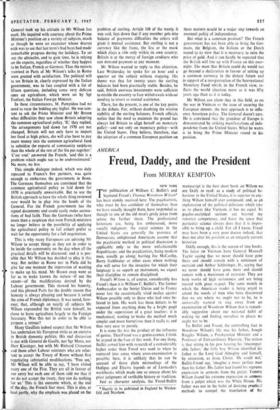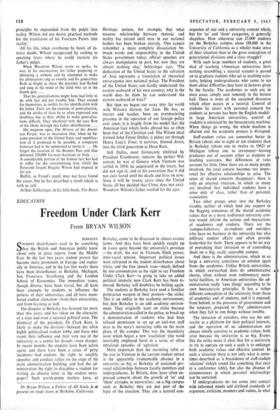Freud, Daddy, and the President
AMERICA
From MURRAY KEMPTON
NEW YORK
THE publication of William C. Bullitt's and Sigmund Freud's Thomas Woodrow Wilson* has been stonily received here. The psychiatrists, who must be less confident of themselves than we have usually thought them, have responded as though to one of the old man's grisly jokes from across the farther shore. The professional historians are, being less embarassed, more vocally indignant; the social sciences in the United States are generally the province of Democrats; enlightened Americans assume that the psychiatric method in political discussion is applicable only to the more unfashionable Republicans; and the psychiatrists, being modern men, usually go along; barring Joe McCarthy, Barry Goldwater or other cases where nothing else will serve for the invective for which their language is so superb an instrument, we expect their discipline to remain disciplined.
Freud's Wilson is, of course, considerably less Freud's than it is William C. Bullitt's. The former Ambassador to the Soviet Union and to France never lost the eccentrically vivid malice against Wilson possible only to those who had once be- lieved in him. His work has those defects to be expected from anything done by a bright pupil under the supervision of a great teacher: it is mechanical, tending to make the method much simpler and more bumptious than it really is, and thus very easy to parody.
It is none the less the product of the influence of genius. That Freud was a genius cannot, I think be argued in the face of this work. For one thing, Bullitt armed him with research of a considerably higher order than Freud was used to when he ventured into areas where cross-examination is possible; here, it is unlikely that he can be accused of those plain misreadings of the Oedipus and Electra legends or of Leonardo's workbooks which made one so uneasy about his prior judgments of verifiable history or tradition.
Just as character analysis, the Freud-Bullitt
* Shortly to be published in England by Weiden- feld and Nicolson. manuscript is the best short book on Wilson we are likely to read; as a study of political be-
haviour in the United States, it is superior to any- thing Wilson himself ever composed; and, as an explanation of the political delusions which take us to places like Vietnam, it has no equal. Its psycho-analytical sections are beyond my remotest competence, and leave the sense that particular science always does that it is impos- sible to bring up a child. For all I know, Freud may have been a very poor doctor indeed; that does not alter his position as an uniquely current historian.
Oddly enough, this is the season of tiny books. The latest on Vietnam have General Maxwell Taylor saying that we never should have gone there and should remain with a minimum of restraint and Arthur Schlesinger, Jr., saying that we never should have gone there and should remain with a maximum of restraint. They are both works of high seriousness and are being treated with great respect. The same month in which the American reader is being urged to attend the words of men who have discovered that we are where we ought not to be, he is universally warned to stay away from an examination of Woodrow Wilson that is remark- ably suggestive about our national habit of waking up and finding ourselves in places we ought not to be.
To Bullitt and Freud, the controlling fact in Woodrow Wilson's life was his father, Joseph Ruggles Wilson, a Presbyterian Minister and a Professor of Extraordinary Rhetoric. The notion is that sitting in his pew hearing his 'imcompar- able father,' the little boy Wilson identified his father as the Lord God Almighty and himself, by extension, as Jesus Christ. 'He could not,' Bullitt-Freud say, 'imagine a more perfect man than his father. His father had found his supreme expression in sermons from the pulpit. Tommy Wilson found his extreme expression in sermons from a pulpit which was the White House. His father was not in the habit of devising practical
methods to compel the translation thc principles he expounded from the pulpit into reality. Wilson did not devise practical methods for the translation of his Fourteen Points into reality.'
All his life, when overborne by bouts of in- terior doubt, Wilson recuperated by rushing to speaking tours where he could recreate his father's pulpit.
When Woodrow Wilson wrote or spoke, he was, in his unconscious, his father preparing or delivering a sermon, and he attempted to make his alliterations sing as sweetly and his generalities flash as bright as those the preacher had flashed and sung in the mind of the child who sat in the fourth pew....
That his generalisations might have had little to do with fact did not trouble him. They existed for themselves, as outlets for his identification with his father. Facts are the enemies of generalisation, and the dislike of facts he so often expressed was doubtless due to their ability to make generalisa- tions difficult. They interfered with the easy flow of his libido through this father identification. ...
His magnum opus, The History of the Ameri- can People, was so inaccurate that, when he be- came president of the United States and republica- tion of it promised to be possible, a competent historian had to be summoned to revise it.... He forgot the location of the Brenner Pass and thus delivered 250,000 German-Austrians to Italy. . . . A considerable portion of the human race has had to suffer for the overwhelming love which the Reverend Joseph Ruggles Wilson had inspired in his son.
Bullitt, as Freud's pupil, may not have found the cause, but he has described a result which is with us still.
Arthur Schlesinger, in his little book, The Bluer Heritage, notices, for example, that what tenuous relationship between rhetoric and reality has existed until now in our national leaders has been broken entirely. 'One cannot remember a more complete dissociation be- tween words and responsibility in the United States government today; official speeches are always manipulative in part, but now they are almost nothing else,' Schlesinger says. 'The dedication of the United States to the salvation of Asia represents a translation of rhetorical extravagance into national policy. The President of the United States can hardly understand the eastern seaboard of his own country; why in the world does he think he can understand the eastern seaboard of Asia?'
But then we began our essay into the world with Wilson's distaste for facts. He has, as martyr and teacher, been an overmastering presence in the operation of our foreign policy ever since; it is largely from his model that the American face which looks abroad has so often been that of the Christian cad. The Wilson ideal formed John Foster Dulles; it pulses yet through Henry Luce's Time; it survives, thinned down, into the third generation as Dean Rusk.
Still Dulles, most fortunately inhibited by President Eisenhower, remains the perfect Wil- sonian; he was at Geneva when Vietnam was settled in 1954; he acquiesced in the treaty, but did not sign it; and so his conviction that it did not exist lasted until his death and lives on now. Soon it will be twenty years since the United States all but decided that China does not exist. Woodrow Wilson's father worked for the ages.































 Previous page
Previous page